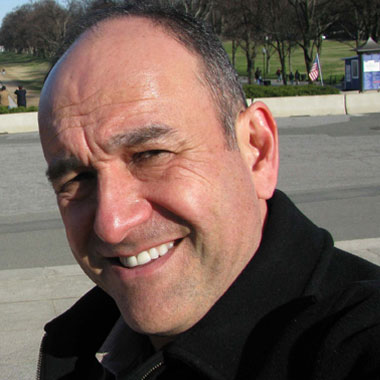He passionately toils at the crossroads of medicine and artificial intelligence (AI), making it easier and faster for healthcare providers to use artificial intelligence and machine learning (ML) to diagnose and treat patients. Alex Karargyris traces that passion to Greece, the homeland of celebrated scientific pioneers like Archimedes and Hippocrates. He credits the modern-day scientists in the home there, where he grew up.
“You see now the influence of one’s family and strong parents,” he said.
In this Tech Barometer segment, meet one of the leading scientists behind MedPerf, an ML platform for testing applications and data models for the healthcare industry. It enables the training of AI models regularly to ensure that researchers and clinicians can access the latest validated models. He’s working with leading computer scientists and healthcare professionals to make sure MedPerf can work across hybrid multicloud IT systems.
“Many hospitals and healthcare organizations don't have the infrastructure to run this, but they want to join this AI ecosystem,” he said.
In July 2023, Nature Machine Intelligence published a research paper describing MedPerf. Karargyris co-authored the article. Since then, the open-source platform has gained a lot of interest in across healthcare industry leaders who want to find a secure, reliable way to validate the mathematical models that are integral to AI and ML applications.
“If you go right now to an operating room or a radiology department, there's so many sensors and techie gadgets everywhere lighting up,” Karargyris said.
“Imagine what it does to the clinicians when they have to ingest all this information, process it and make a critical decision.”
Medical institutions are reluctant to send sensitive data over a network for analysis by an AI model. MedPerf’s proposed solution relies on federated evaluation.
“The data never leaves the hospital,” Karargyris added. Clinicians in any location can run a benchmark on a model registered on MedPerf and evaluate it with their local data. MedPerf’s team applies standards and best practices to help ensure model evaluation leads to clinically insightful results (e.g., identify bias, health equity, etc.).
“Think about having a foundation model that is customized to a particular person,” Karargyris said.
That would place knowledge accumulated around the world over several years in the hands of a single doctor hoping to tailor a cure to a particular patient’s cancer or diabetes.
Related:
- IT Leaders Get AI Ready and Go
- Nutanix State of Enterprise AI Report
- Take Control of Your AI with Optimal Infrastructure Built For Success
- Moving Healthcare IT Faster Into the Future
- How Digital Twin Technology Can Propel Personalized Healthcare
- Solving Generative AI’s IP Problem
- Who Owns AI?: The Rise of Artificial Intelligence Patent Law
- The Amalgamation of AI and Hybrid Cloud
- Healthcare Technologies Paving the Way From Treatment to Prevention
Transcript:
Alex Karargyris: Healthcare technology, what it used to be like 50 years ago, has changed dramatically. You go right now to some operating room or even a radiology department, and there's so many sensors and gadgets everywhere. It's natural for machines to be able to process this information and funnel it to something that is meaningful to the human and let the human make the final decision. Right?
Jason Lopez: That's Alex Karargyris, co-chair for the Medical Working Group, which is a part of a large nonprofit organization called ML Commons. He's also the co-author of the paper, "Federated Benchmarking of Medical Artificial Intelligence With Med Perf." AI models have become an integral part of our lives, whether it's your smartphone, recognizing your voice or a healthcare facility using a model to detect cancer and X-rays. That's AI at work. This is the Tech Barometer Podcast, I'm Jason Lopez. AI models perform specific tasks. It's like an expert who's had extensive training and learned from vast amounts of information to become great at their assigned job.
Alex Karargyris: So all these models are developed by different groups. It could be academics, it could be vendors like companies that develop AI systems. It could be internal researchers at the hospitals. It could be a kid on the blog that writes some code in Python and writes a model using cargo, open source datasets. So all these models, they do some specific task and they're trained on data that you find either internally or you acquire, you paid for them or in the public domain. So once you build these models, then you have to deploy them. You have to take them to the hospital to do a specific task like organizing cancer or an x-rays.
Jason Lopez: AI models start off as a blank slate. They have to be fed data and to improve, have to continually be fed. Deep learning models have an insatiable appetite for data, and the more they consume, the better they perform.
Alex Karargyris: Similar to a doctor that is in 1 million, let's say patients, right? And once you train this model, you need to test it. You need to validate it, and you need to validate it in a diverse selection of data out there in the real world. These were, the testing comes, it's called benchmarking.
Jason Lopez: This piece of the story is really important. Alex and his colleagues are focusing on getting AI models to perform as accurately as possible, which means reducing the bias that an AI model might produce. So, let's go back to the blank slate.
Alex Karargyris: So you have a model that knows nothing. You have a machine. If you give 'em an X-ray, it doesn't tell you if it's cancer or not cancer. So you have to train it. So you need to keep all this data. You have privacy concerns, so you need to be careful with that when it comes to healthcare.
Jason Lopez: And that carefulness means a hypersensitivity to security concerns. Centralizing the data of several or several hundred healthcare facilities in order to train AI models will not work. That's where federated learning comes in, deploying an AI model to the hospital where it learns on site, the place where the data securely resides.
Alex Karargyris: But when you take that model, and let's say you train until, let's say in Indiana, and you see population data from that particular area, and you take that model and you deploy, let's say in California, the population is different, right? So your model, which was trained in Indiana population data might be biased to that particular population. So when you move to California and then maybe in the Bay Area, which has a large Asian descent population, it might fail. So this is where, before you deploy it in the clinical workflow, you need to validate it. You need to make sure that you test it thoroughly in a diverse population.
Jason Lopez: The MedPerf idea is to test AI models on real-world data from diverse locations, ensuring the models meet high-quality standards and maintain security and privacy.
Alex Karargyris: We wanted to contribute to this effort to build an open platform that allows you to facilitate this testing. How can you test models that were already trained in a limited dataset or whatever dataset? How can you test them out in real-world data from multiple diverse locations so that you can feel confident that these particular models or any model are meeting high-quality requirements? This is where we are.
Jason Lopez: Alex Karargyris is from Greece in the late eighties and nineties. His father brought in some of the first computers to his hometown and started a school of computer science.
Alex Karargyris: We used to get these expensive monochrome, green color screen computers at home, and also he had plenty of books like CBA and Assembly and me and my brother. We would spend a lot of time hitting some programming back in the days, printing asterisks and stuff if-then statements, and eventually, we moved on to have a little bit more serious machines in the early nineties with the Intel pendulum. And of course, like any other kids, we got into the commuter games, video games, games, so a lot of video gaming, but eventually decided to go to electrical engineering and computer engineering in Greece. And during the last two years of school, you have to choose which direction you want to go to. I was always intrigued with medicine. My brother was also in the medical school back then. At some point, I was considering switching to biology, so quite earlier.
Jason Lopez: Alex's mother was a biologist, and that's one factor in his future at the time. And as a student being pulled in two directions, it was later that he discovered he could sort of do both.
Alex Karargyris: Right now, we are living in a world where computers are everywhere, and AI is one of the major forces around us, and it's becoming mainstream. And I'm glad I'm working in a field that is the intersection of improving healthcare but also scientific approaches like artificial intelligence.
Jason Lopez: One side note Alex gave us when we chatted with him about his computer science background was his introduction to remote computing through learning about programs like the search for Extraterrestrial Intelligence or seti. That was an early example of what we now think of as cloud storage and resources.
Alex Karargyris: When it comes to healthcare, I would say the tensions are stronger there. Sometimes, yes, there's a tendency to go to move to the cloud, but there's also this tendency of for protecting privacy to keep it locally. But I think healthcare systems and organizations understand that it's hard to maintain local resources, and that's why many of these laws that were written back in the nineties HIP and all this, that forced privacy, they cannot take into consideration right now to allow basically the migration to the cloud.
Jason Lopez: AI's increasing presence with the rise of cloud services is overall a good thing for healthcare. Despite the extra effort needed to satisfy security and privacy requirements, anyone with knowledge to develop AI systems from anywhere in the world can contribute.
Alex Karargyris: Healthcare goes, skyrockets in the United States, I think it's like, I don't know how many trillion right now. There's a shortage of experts to support these tasks, and it's natural that people are looking into AI to help fill in the gaps and also to reduce the overload that maybe clinicians have in this field.
Jason Lopez: As AI's capabilities expand, especially with innovations like ChatGPT, it's critical to understand its role as an assistant, not a substitute. Over time, as with any new technology, apprehensions will settle and AI will seamlessly integrate into clinicians' daily tasks.
Alex Karargyris: We are witnessing how AI can be transformative to many industries lately. And similarly, I think AI has impacted multiple facets of healthcare. I mean, from drug discovery to diagnosing therapeutics, it can contribute to a reduction in healthcare costs as well as the improvement of healthcare delivery quality. More and more people need to be taken care of as well and the limited amount of experts are around to support this delivery. There's a gap that needs to be filled, and I think that's the opportunity for that AI can offer.
Jason Lopez: Alex Karargyris is a member of the nonprofit organization, ML Commons, where he's co-chair for the medical working group. He's also the co-author of the paper, federated Benchmarking of Medical Artificial Intelligence with Med Perf. There are two other stories in our series on Med Perf, one on the MedPerf paper, and another on Alex's colleague Debo Dutta, another pioneer in the intersection of AI in healthcare. This is the Tech Barometer podcast produced by the Forecast. You can find more reporting on technology at theforecastbynutanix.com.
Editor’s note: Learn more about the Nutanix platform for AI, including Nutanix GPT-in-a-Box, a full-stack software-defined AI-ready platform designed to simplify and jump-start your initiatives from edge to core.
Jason Lopez is executive producer of Tech Barometer, the podcast outlet for The Forecast. He’s the founder of Connected Social Media. Previously, he was executive producer at PodTech and a reporter at NPR.
Ken Kaplan contributed to this story. He’s editor in chief of The Forecast. Find him on X @kenekaplan.
© 2023 Nutanix, Inc. All rights reserved. For additional legal information, please go here.














